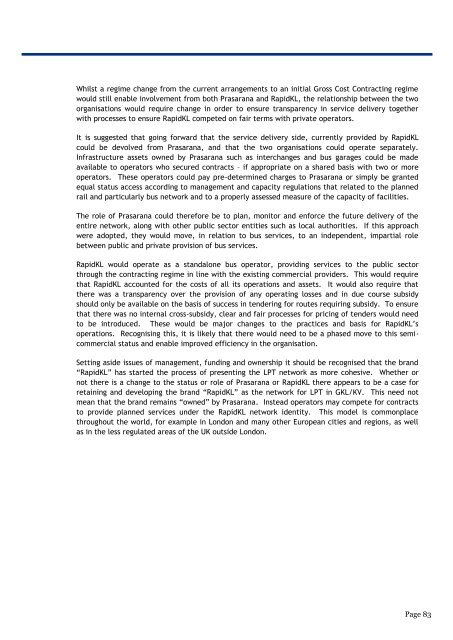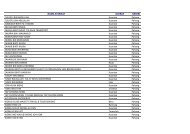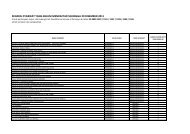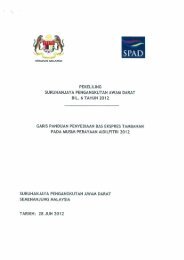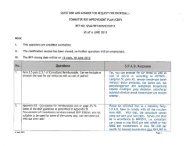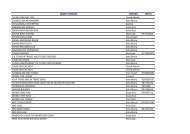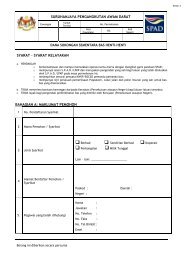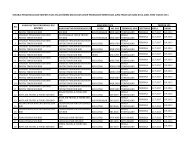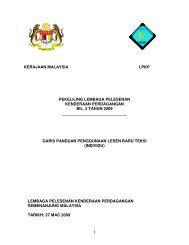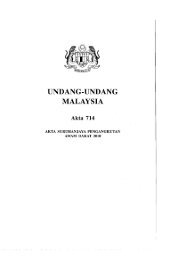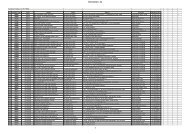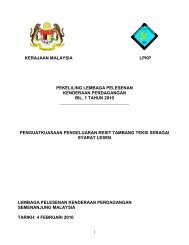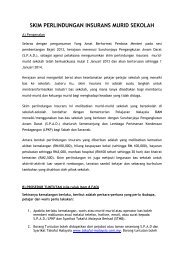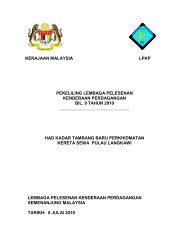Contents - SPAD
Contents - SPAD
Contents - SPAD
You also want an ePaper? Increase the reach of your titles
YUMPU automatically turns print PDFs into web optimized ePapers that Google loves.
Whilst a regime change from the current arrangements to an initial Gross Cost Contracting regime<br />
would still enable involvement from both Prasarana and RapidKL, the relationship between the two<br />
organisations would require change in order to ensure transparency in service delivery together<br />
with processes to ensure RapidKL competed on fair terms with private operators.<br />
It is suggested that going forward that the service delivery side, currently provided by RapidKL<br />
could be devolved from Prasarana, and that the two organisations could operate separately.<br />
Infrastructure assets owned by Prasarana such as interchanges and bus garages could be made<br />
available to operators who secured contracts – if appropriate on a shared basis with two or more<br />
operators. These operators could pay pre-determined charges to Prasarana or simply be granted<br />
equal status access according to management and capacity regulations that related to the planned<br />
rail and particularly bus network and to a properly assessed measure of the capacity of facilities.<br />
The role of Prasarana could therefore be to plan, monitor and enforce the future delivery of the<br />
entire network, along with other public sector entities such as local authorities. If this approach<br />
were adopted, they would move, in relation to bus services, to an independent, impartial role<br />
between public and private provision of bus services.<br />
RapidKL would operate as a standalone bus operator, providing services to the public sector<br />
through the contracting regime in line with the existing commercial providers. This would require<br />
that RapidKL accounted for the costs of all its operations and assets. It would also require that<br />
there was a transparency over the provision of any operating losses and in due course subsidy<br />
should only be available on the basis of success in tendering for routes requiring subsidy. To ensure<br />
that there was no internal cross-subsidy, clear and fair processes for pricing of tenders would need<br />
to be introduced. These would be major changes to the practices and basis for RapidKL‟s<br />
operations. Recognising this, it is likely that there would need to be a phased move to this semicommercial<br />
status and enable improved efficiency in the organisation.<br />
Setting aside issues of management, funding and ownership it should be recognised that the brand<br />
“RapidKL” has started the process of presenting the LPT network as more cohesive. Whether or<br />
not there is a change to the status or role of Prasarana or RapidKL there appears to be a case for<br />
retaining and developing the brand “RapidKL” as the network for LPT in GKL/KV. This need not<br />
mean that the brand remains “owned” by Prasarana. Instead operators may compete for contracts<br />
to provide planned services under the RapidKL network identity. This model is commonplace<br />
throughout the world, for example in London and many other European cities and regions, as well<br />
as in the less regulated areas of the UK outside London.<br />
Page 83


